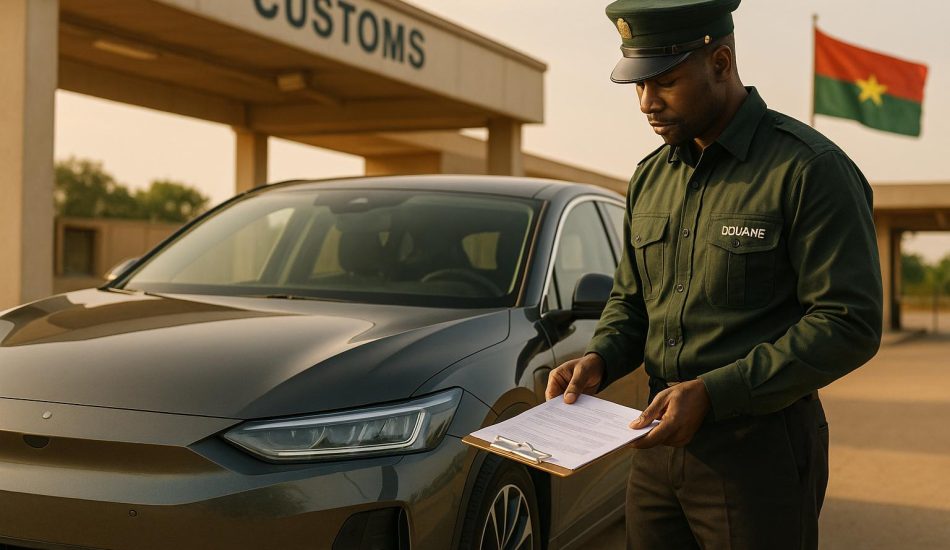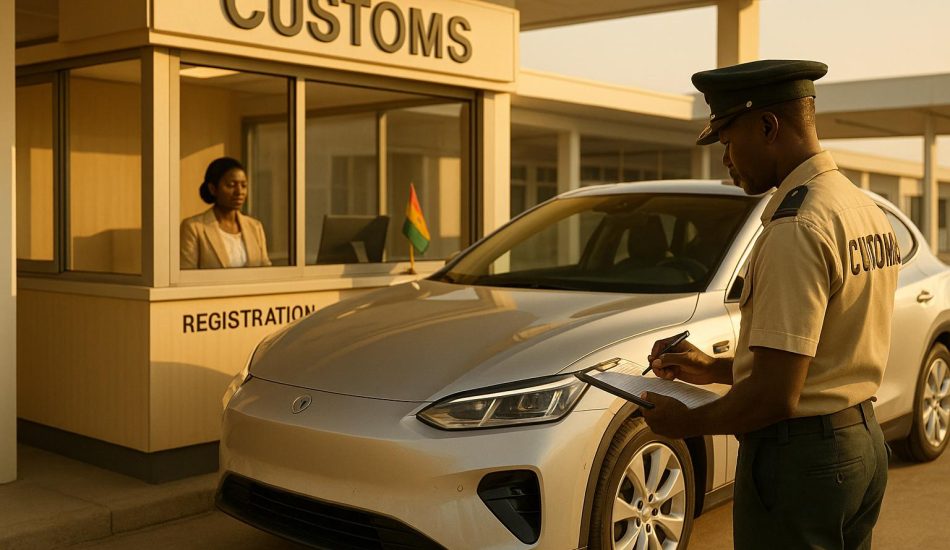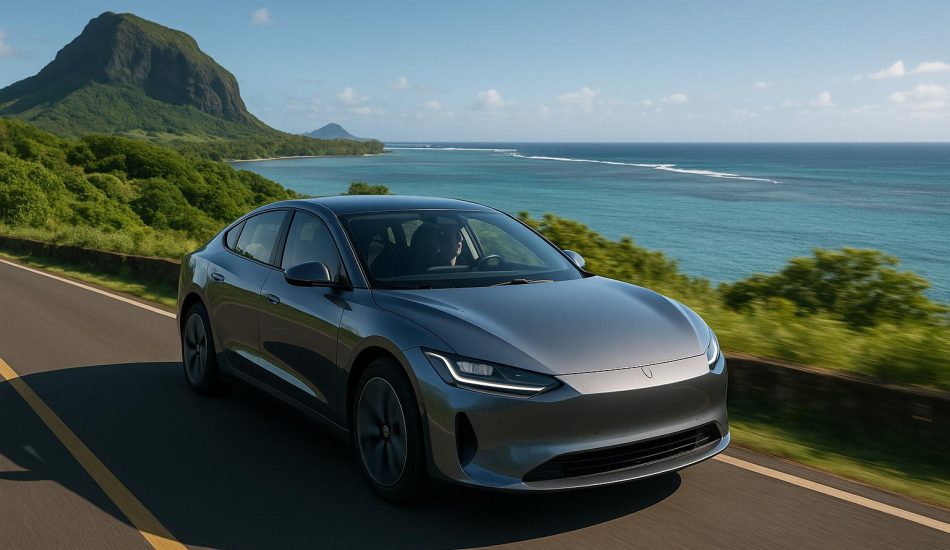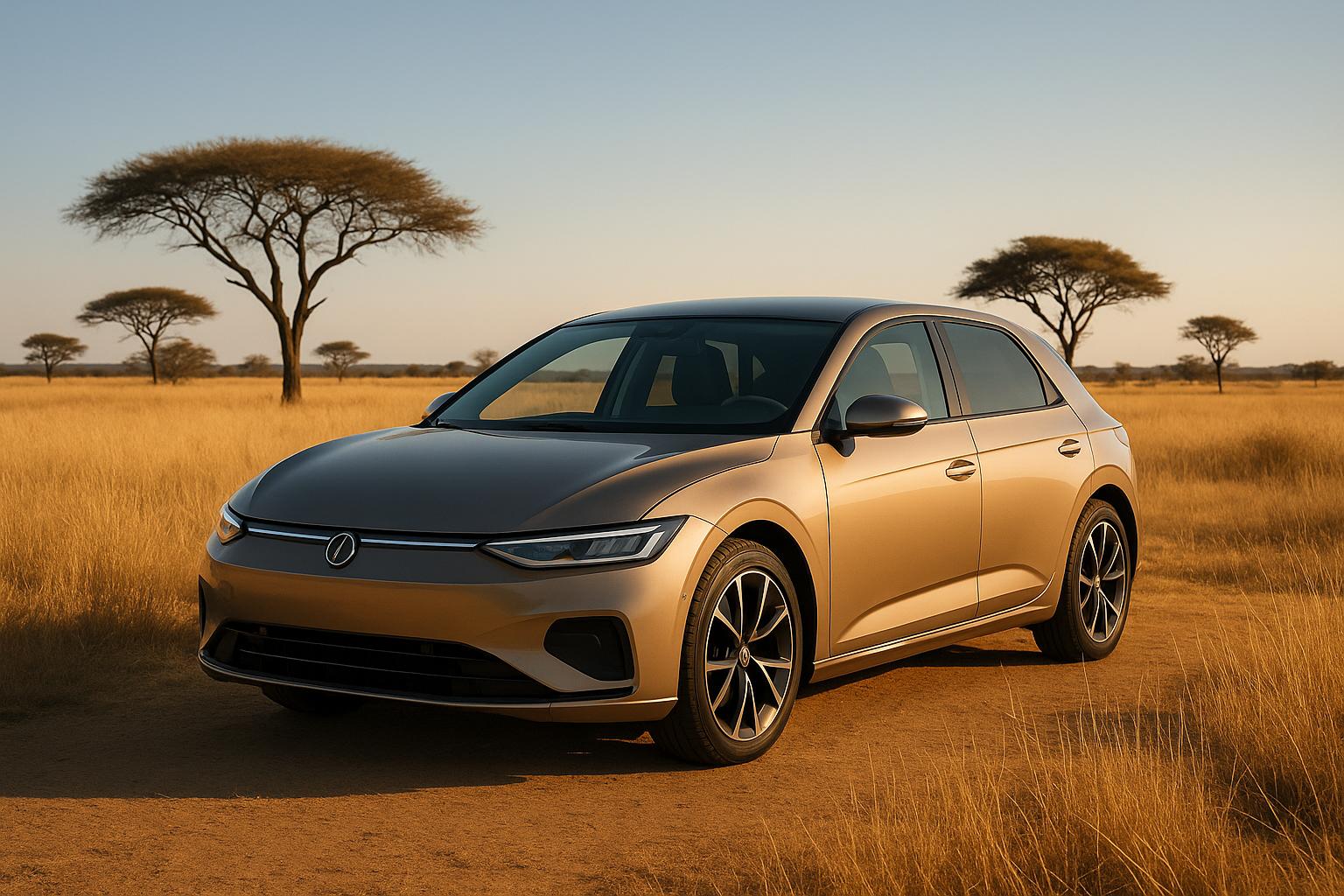
- Top EV Choices for Botswana:
- BYD Atto 3: Family-friendly, with up to 420 km range. Prices start at $39,990.
- Hyundai Kona Electric: Great for longer trips with extended range options.
- City Blitz Van: Affordable at $13,900, ideal for urban deliveries (150–160 km range).
- Importing EVs Made Easier:
- Import duty reduced from 40% to 25% (as of January 2025).
- Key documents include an Import Permit, Customs Declaration Form, and Police Clearance Certificate.
- Shipping via RoRo (cheaper) or Container (safer) options.
- Why EVs?:
- Save up to P20,000 annually on maintenance and fuel.
- Reduce carbon emissions by 80%.
- Pair with solar panels for energy independence.
- Quick Comparison:
| Model | Range | Price (USD) | Best For |
|---|---|---|---|
| BYD Atto 3 Essential | 352 km (219 miles) | $39,990 | Families, daily commuting |
| BYD Atto 3 Premium | 410–420 km (255–261 miles) | $44,990 | Long-distance travel |
| Hyundai Kona Electric | Varies (extended) | Varies | Extended range needs |
| City Blitz Van | 150–160 km (93–99 miles) | $13,900 | Commercial operations |
Ready to switch to electric? This guide covers everything from the best EVs for Botswana to import steps, costs, and benefits. Read on for details!
Best Electric Vehicle Models for Botswana
When selecting an electric vehicle for Botswana, it’s all about finding the right mix of range, practicality, and affordability. Here are three standout models that cater to a variety of needs and budgets, perfectly suited for Botswana’s urban settings and cost-conscious drivers.
BYD Atto 3
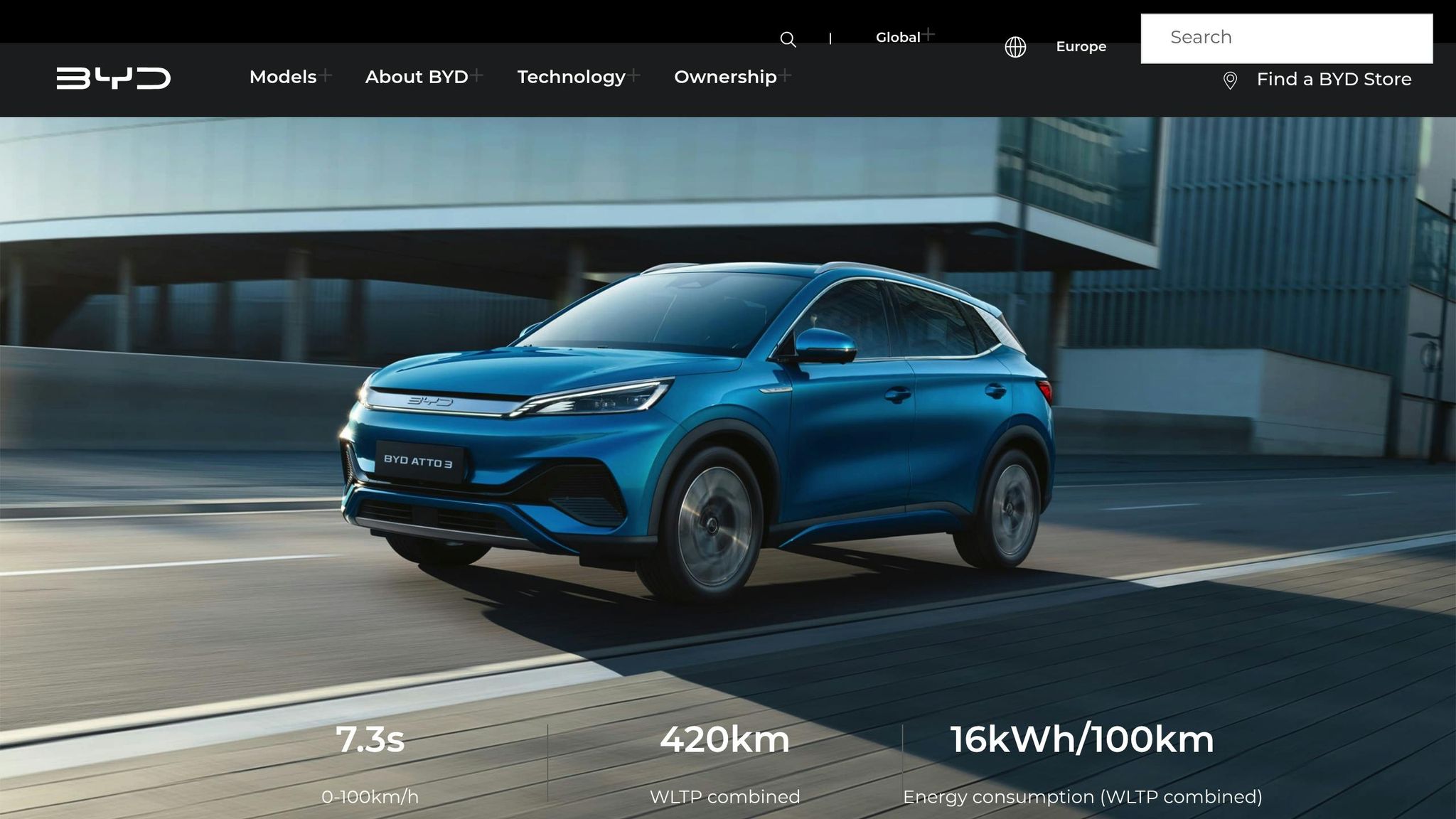
The BYD Atto 3 offers a great balance of range, safety, and functionality. The Essential variant provides a WLTP range of 352 km (about 219 miles) per charge, making it ideal for daily use. Safety is a priority with its 5-Star Euro NCAP Safety Rating and features like Rear Cross Traffic Alert and Blind Spot Detection. Families will appreciate its roomy interior, boasting a 555 L (19.6 ft³) trunk that expands to 1,338 L (47.2 ft³) with the rear seats folded. The car’s performance is also impressive, accelerating from 0–100 km/h (0–62 mph) in just 7.3 seconds.
For those looking for more range, the Premium Extended Range variant comes with a 60.48 kWh battery, offering 410–420 km (255–261 miles) on a single charge. Pricing starts at $39,990 for the Essential Standard Range model, while the Premium Extended Range version is priced at $44,990 (excluding on-road costs).
Hyundai Kona Electric
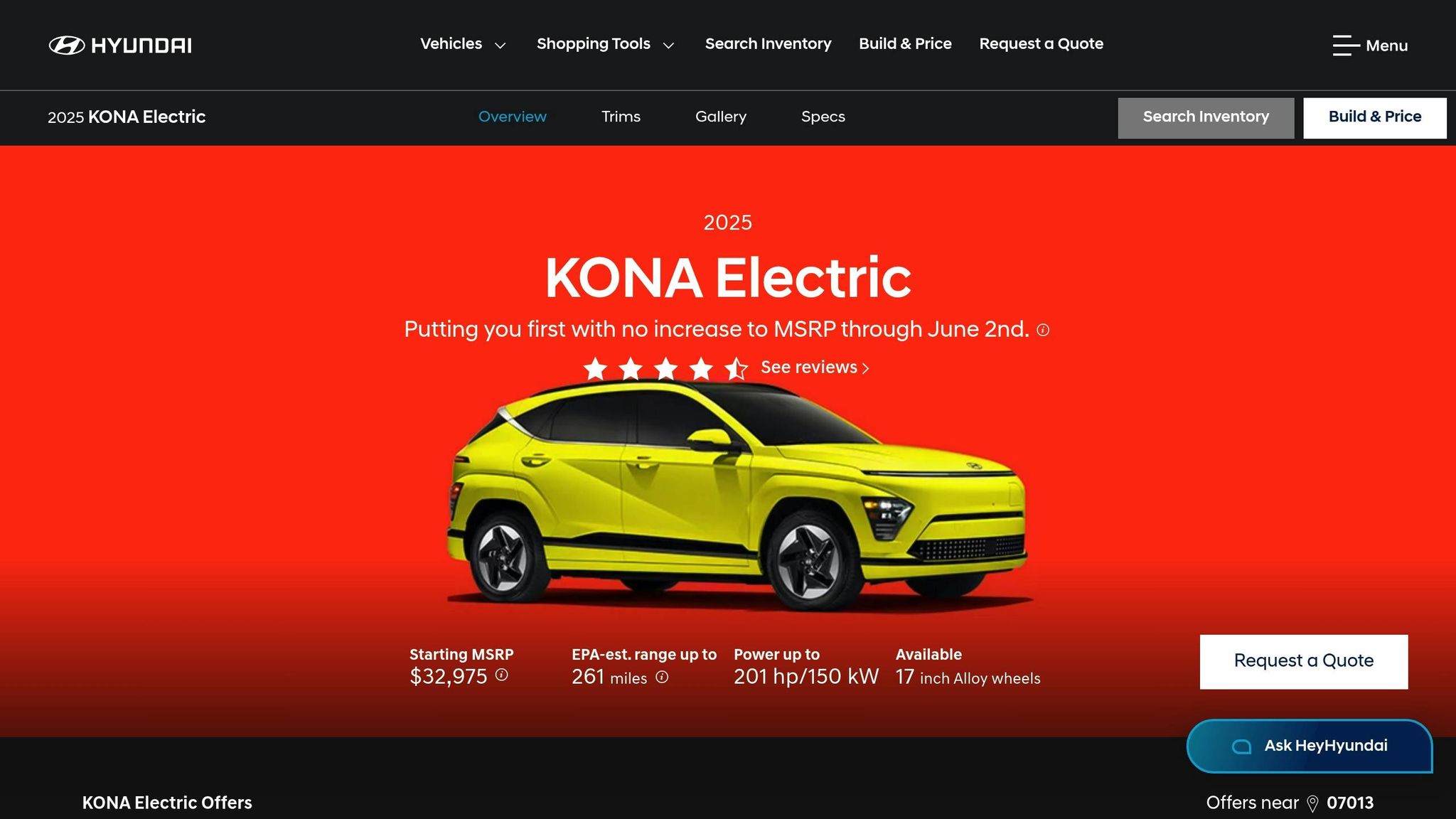
The Hyundai Kona Electric is a solid choice for drivers seeking a longer driving range, making it perfect for extended trips across Botswana. Its sturdy build and higher ground clearance handle both city streets and rougher terrains with ease. Hyundai’s strong global reputation also ensures reliable after-sales support, which is a big plus for long-term ownership.
City Blitz Van
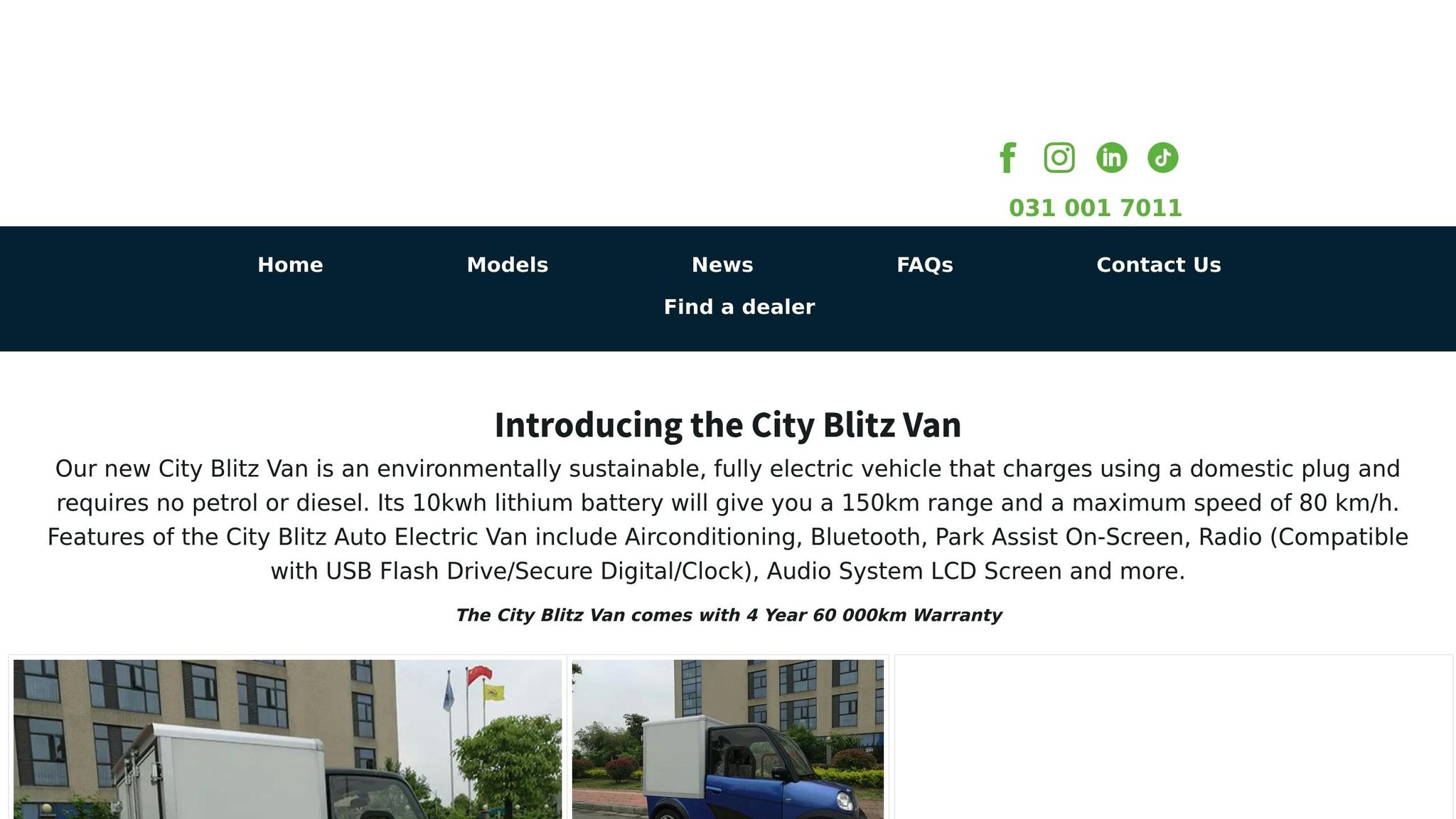
For businesses, the City Blitz Van is a practical and cost-effective option. Priced at R249,900 (around $13,900), this compact van offers a range of 150–160 km (93–99 miles) and a top speed of about 80 km/h (50 mph), making it ideal for urban deliveries and short trips. Its zero-emission design is a game-changer for indoor operations, where traditional gasoline or diesel vehicles fall short. Charging is simple – just plug it into a standard 220V household socket, and it’ll be fully charged in 4–6 hours. Running costs are minimal at 13 cents per kilometer (8 cents per mile).
The City Blitz lineup also includes a 4-Seater model and a Pickup variant, both priced at R239,900 (around $13,300). The 4-Seater currently holds the title of the most affordable electric car in South Africa.
Here’s a quick comparison of these models:
| Model | Range | Price (USD) | Best For |
|---|---|---|---|
| BYD Atto 3 Essential | 352 km (219 miles) | $39,990 | Families, daily commuting |
| BYD Atto 3 Premium | 410–420 km (255–261 miles) | $44,990 | Long-distance travel |
| Hyundai Kona Electric | Extended range (varies) | Varies | Extended range needs |
| City Blitz Van | 150–160 km (93–99 miles) | $13,900 | Commercial operations |
These vehicles cater to a variety of needs, from family-friendly transport to efficient commercial use, making them excellent choices for Botswana’s growing electric vehicle market.
How to Import Electric Vehicles into Botswana
Bringing an electric vehicle into Botswana is a manageable process if you plan ahead and have the right paperwork. Starting in January 2025, the government has reduced the import duty on electric vehicles from 40% to 25%, making it a more appealing option for buyers.
Required Documents
Before importing, make sure you gather all the necessary documents. Since these come from various sources, it’s smart to start early. The Botswana Unified Revenue Service (BURS) oversees most customs-related paperwork, while other documents are issued by different departments.
Here’s a quick overview of the required documents and where to get them:
| Document | Where to Obtain |
|---|---|
| Import Permit | Ministry of Commerce |
| Police Clearance Certificate | Export country and Botswana Police Service |
| Customs Declaration Form SAD 500 | Botswana Unified Revenue Service (BURS) |
| Title and Registration Certificate | Country of origin |
| Registration Document | Country of origin |
| Form CE 101 | Department of Customs and Excise |
| Purchasing Invoice | Seller |
| Vehicle Evaluation | Accredited Used Car Dealer |
| IC 2 Application | Destination Agent |
The Police Clearance Certificate is a key requirement, and the Form CE 101 is critical for customs clearance. Hiring a reliable clearing service can speed up the process, and visiting the BURS office in Gaborone can help clarify tax calculations, registration requirements, or any other concerns.
Once your paperwork is sorted, it’s time to review the costs involved.
Import Costs and Fees
After gathering the necessary documents, prepare for additional expenses like shipping, import duties, and VAT. Starting January 2025, the import duty has been reduced to 25%, down from 40%. The total fees are calculated based on the vehicle’s assessable value, which includes both its declared price and shipping costs. Providing accurate documentation of your purchase price and the vehicle’s condition will help customs determine the correct fees.
Shipping Options
Once your paperwork and fees are in order, select a shipping method that works for you. Since Botswana is landlocked, your vehicle will first arrive at a port in a neighboring country – most commonly Durban, South Africa, or Walvis Bay, Namibia. Durban handles about 80% of vehicle imports due to its convenience and relatively short transit times (about 30 days from Japan, plus 2–4 days for delivery to Gaborone).
You can choose between two main shipping methods:
- RoRo (Roll-on/Roll-off): This is often the more budget-friendly option, with rates starting as low as US$65 from Japan. Your vehicle is driven directly onto and off the ship, reducing handling and the risk of damage. RoRo is ideal for operational vehicles and when you’re not shipping extra items.
- Container Shipping: While more expensive (around US$2,500 for a 20-foot container from Japan), this method offers greater protection. It’s a good choice for non-operational vehicles or if you need to ship spare parts, accessories, or multiple smaller vehicles in the same container.
Shipping costs vary depending on the origin and method. For example, shipments from Japan typically range from US$2,500 to US$4,800, while those from the U.S. cost between US$1,800 and US$3,900. RoRo services are more frequent and faster, but container shipping provides added security, albeit with fewer departure schedules and longer processing times.
sbb-itb-99e19e3
Botswana EV Import Rules and Requirements
Importing an electric vehicle (EV) into Botswana involves navigating strict regulations, including classification under tariff code 87049040. Whether you’re planning a short-term or permanent import, it’s essential to understand the rules and follow the process carefully to ensure compliance. Botswana categorizes EV imports into temporary and permanent options, each with distinct requirements.
Temporary vs. Permanent Import Options
Temporary Import Permits allow EVs to enter Botswana for up to 14 days without paying duty. If you need to extend this period, you can do so for up to 30 days, but you’ll incur additional fees. These include a National Road Safety Fund levy of P40.00 (about $3.00), along with road permits and insurance costs that amount to roughly $30.77 for a 4×4 vehicle. On the other hand, permanent imports require full customs clearance and payment of duty and VAT within 14 days.
If you’re shipping an EV to or from a non-SACU country, you’ll also need a Carnet de Passage. Once you’ve determined whether your import is temporary or permanent, the next step is ensuring your EV meets Botswana’s safety and compliance standards.
Vehicle Safety and Compliance Standards
Botswana has established safety standards for EVs as part of its broader strategy to reduce greenhouse gas emissions and promote the growth of its electromobility sector. Vehicles imported from SADC countries may qualify for duty-free status, and the government is working on additional tax incentives for EVs, such as tax breaks and investments in charging infrastructure.
To stay up to date on import duties and compliance requirements, you can visit the Botswana Trade Portal at botswanatradeportal.org.bw or consult trade.gov for VAT-specific details. For any questions or extensions, the Botswana Unified Revenue Service (BURS) is your go-to resource.
Volkswagen Group Africa Chairperson Martina Biene highlighted a key challenge for the African EV market:
"Africa needs infrastructure – charging stations, reliable power, and skilled technicians"
This insight emphasizes the importance of ensuring your EV complies with Botswana’s safety and environmental standards while the country continues to develop its EV infrastructure.
If you need assistance, EV24.africa offers support with customs clearance, registration, and import taxes to ensure your vehicle meets all local regulations.
Conclusion: Choosing the Right EV for Botswana
Selecting the ideal electric vehicle (EV) depends entirely on your specific needs – be it daily commuting or commercial operations. Options like the BYD Atto 3, Hyundai Kona Electric, and City Blitz Van cater to different lifestyles, from city driving to business use. These choices, paired with a straightforward import process, make owning an EV in Botswana a practical and rewarding experience.
Affordability and savings play a key role in this decision. For EVs to compete with pre-owned internal combustion engine vehicles, they must be reasonably priced. Households in Botswana stand to save up to P20,000 annually on transportation costs, thanks to the efficiency and lower maintenance expenses of EVs.
As discussed earlier, understanding the import process simplifies ownership. With reduced import duties, the costs become more predictable. Whether you opt for temporary or permanent importation, the process is designed to support cost-effective EV ownership.
Infrastructure development is another factor improving the EV experience. Botswana’s President Mokgweetsi Masisi has highlighted the country’s commitment to e-mobility, stating:
"This is one of the examples of our commitment to e-mobility. We want to play a part in this, not just for our economy and environment but also to enhance those aspects of our knowledge economy that optimize our natural endowments."
Pairing EV charging with solar panels can further enhance energy independence. Evaluating your daily driving patterns and charging options is crucial to choosing the right charging technology for your needs.
With a vehicle ownership rate of 206 vehicles per 1,000 people – well above the African average of 43 per 1,000 – Botswana is well-positioned for the shift to electric mobility. EVs deliver immediate environmental benefits, cutting carbon emissions by 80%, alongside long-term financial advantages such as reduced maintenance costs.
To make the transition even smoother, platforms like EV24.africa offer end-to-end support, including customs clearance, registration, and managing import taxes, ensuring compliance with local regulations. Whether you choose flexible financing options or buy outright, switching to electric mobility in Botswana promises environmental progress, economic stability, and enhanced energy security.
FAQs
What are the key advantages of driving an electric vehicle in Botswana?
Switching to an electric vehicle (EV) in Botswana comes with several compelling perks:
- Cleaner Air: Since EVs produce zero tailpipe emissions, they significantly cut down on air pollution, contributing to better air quality across the country.
- Lower Costs: EVs are highly energy-efficient, which means drivers can save thousands of pula each year on fuel and maintenance.
- Less Dependence on Imports: By running on locally generated electricity, EVs reduce the need for imported oil, shielding Botswana from the volatility of global fuel prices.
Beyond these benefits, the shift to EVs plays a key role in advancing Botswana’s journey toward a greener economy. This transition not only encourages sustainable growth but also opens up new job opportunities in emerging industries.
How does the reduced import duty affect the cost of bringing an electric vehicle into Botswana?
The import duty on electric vehicles in Botswana has been slashed, making EVs far more affordable for consumers. Once set at 25%, the duty now stands at just 10%, significantly lowering the overall cost of buying and bringing in an electric car.
This policy shift doesn’t just save buyers money – it’s part of a broader government initiative to encourage EV adoption. By making these vehicles more accessible, Botswana is taking steps toward reducing dependence on fossil fuels and paving the way for a cleaner, energy-efficient future.
What are the key steps to ensure my imported electric vehicle meets Botswana’s safety and compliance requirements?
To bring your electric vehicle (EV) into Botswana and ensure it meets the country’s safety and compliance standards, you’ll need to follow a few key steps. First, secure a Certificate of Conformity from an accredited inspection body. This document confirms that your EV aligns with Botswana’s specific regulations. Additionally, your vehicle must meet the Euro III emission standards and pass the Botswana Vehicle Inspection and Certification (BVIC) program, which evaluates both safety and emissions compliance.
You’ll also need to gather essential paperwork, such as the original customs form, vehicle registration documents, and any evaluation reports from authorized dealers. Once that’s ready, proceed with the customs clearance process through the Botswana Unified Revenue Service (BURS). Be sure to submit the necessary import permits and pay any applicable duties. Following these steps will help ensure your EV is ready for the roads in Botswana without unnecessary delays.


